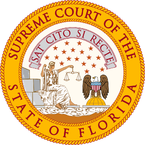Florida Chief Justice establishes Guardianship workgroup
FOR IMMEDIATE RELEASE 10/24/2016
Contact: Craig Waters, Director of Public Information
Florida Supreme Court
(850) 414-7641
Workgroup to Focus on Guardianship Issues in Florida’s Courts
TALLAHASSEE – Few decisions are more challenging to a judge than removing a person’s rights because they are no longer capable of making decisions independently, Florida Chief Justice Jorge Labarga said Monday. Yet caseloads are increasing in number and complexity and have convinced him to create a workgroup to study guardianships in the court system with a goal of improving accountability to better protect vulnerable people – children, adults with developmental and mental disabilities, and the elderly.
“As Florida grows and ages, we can expect more and more cases dealing with guardianship issues to come into our courts,” Labarga said. “As judges, we are committed to protecting the rights of individuals involved in these matters and doing everything in our power to ensure their safety, security, and well-being.”
Florida’s guardianship system exists to assist and protect an individual who is judged by a court to be unable to make decisions for himself or herself. When appointed by the court, guardians can make decisions about an individual’s care, finances, or property on their behalf.
On Friday, Labarga established the Guardianship Workgroup under the Court’s Judicial Management Council<http://www.flcourts.org/administration-funding/court-committees.stml>, the group that advises the chief justice and the Supreme Court on long-range issues confronting Florida’s judiciary. Three JMC members will be appointed to serve on the workgroup, including Judge Olin Shinholser who has been a member of the JMC since 2012 and will serve as chair of the workgroup. Shinholser has served the judiciary in the 10th Judicial Circuit for over 26 years. His knowledge and experience will guide the workgroup.
“There is often tension, clash and/or conflict between the needs, interests and desires of the ward and those of the guardian, caregivers and families of the ward,” Shinholser said. “The system must be sensitive that it fairly and adequately assists, protects and safeguards the rights and welfare of the ward while allowing the necessary tools to those providing and supervising the care of the ward. Comments and complaints from various stakeholders are indicative that we need to take a closer look at whether the rules and procedures in place accomplish the balance needed.”
The workgroup will examine judicial procedures and best practices pertaining to guardianship to ensure that courts are best protecting the person, property, and rights of individuals who have been judged to be incapacitated and persons who may have diminished capacity to function independently.
In the last two legislative sessions, state lawmakers passed laws addressing guardianship concerns. The state’s regulation and oversight of guardians was increased and measures designed to curb abuses enacted.
“This is an appropriate time to re-evaluate our system and determine if the courts are doing everything possible to meet the needs of everyone involved,” Labarga said.
The workgroup will focus on the following issues:
· the use of least restrictive alternatives that address specific functional limitations;
· determinations of incapacity;
· restoration of capacity;
· the assessment and assignment of costs associated with guardianship administration;
· post adjudicatory proceedings and responsibilities related to guardianship, including the rights guaranteed by Florida law; and
· training opportunities available to judges and court staff.
The workgroup will provide the Supreme Court with a report evaluating guardianship practices and recommending ways to enhance the guardianship process. An interim report is due to the Court by October 2017 and a final report is due to the Court by September 2018.Additional workgroup members include:
· Judge Robert Lee, Broward County, Ft. Lauderdale (JMC Member)
· Judge Michelle Morley, 5th Circuit, Bushnell
· Judge Peter Dearing, 4th Circuit, Jacksonville
· Judge Maria Korvick, 11th Circuit, Miami
· Mr. Jason Nelson, Office of Public and Professional Guardians, Florida Department of Elder Affairs, Tallahassee
· Mr. Laird Lile, J.D., Lile & Hayes, PLLC, Naples (JMC Member)
· Mr. Andrew Sasso, J.D., Macfarlane Ferguson & McMullen, Clearwater
· Ms. Karen Campbell, J.D., North Florida Office of Public Guardian, Tallahassee
· Ms. Vicki Alkire, CPHQ, LHCRM, MG, CMC, Viable Alternatives, Inc., Sarasota“Further evaluating guardianship practices supports the branch’s goal of ensuring that court procedures and operations are easily understandable and user friendly and supports our mission to protect rights and liberties of all,” Shinholser said. “It’s imperative we stay proactive in this area and provide real solutions to emerging issues.”
For more information about guardianship in Florida’s court system visit the Court Improvement web page at www.flcourts.org<http://www.flcourts.org/resources-and-services/court-improvement/family-courts/guardianship.stml> or to learn about the Florida Supreme Court, www.floridasupremecourt.org<http://www.floridasupremecourt.org>.

